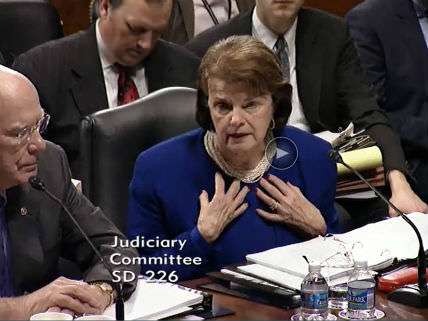Feinstein's Defense of Her 'Assault Weapon' Ban: I Feel, Therefore I Legislate

The exchange between Sen. Ted Cruz (R-Texas) and Sen. Dianne Feinstein (D-Calif.) about the constitutionality of her proposed ban on "assault weapons" at yesterday's Senate Judiciary Committee meeting nicely illustrated a familiar pattern in which people who favor new gun restrictions respond to challenges with emotion-laden non sequiturs. Feinstein, who admonished Cruz for treating her like "a sixth-grader," later told CNN's Wolf Blitzer, "I just felt patronized. I felt he was somewhat arrogant about it." If you watch the video at the end of this post, you can judge for yourself whether Cruz seemed patronizing or arrogant. But the question he posed was perfectly fair: Given that the Second Amendment protects an individual right to arms, just as the First Amendment protects an individual right to freedom of speech and freedom of the press, isn't telling people they may not possess certain guns analogous to telling them they may not possess certain books? In both cases, people retain most of the right guaranteed by the Constitution, but in the First Amendment context that has never been deemed enough for a restriction to pass muster. Feinstein proudly cites the list of more than 2,000 gun models specifically exempted from her ban as evidence that it does not violate the Second Amendment, which Cruz suggested is rather like publishing a list of officially permitted titles as evidence that a book ban does not not violate the First Amendment.
Feinstein could have responded by citing a constitutionally relevant distinction between the guns she wants to ban and the guns she would allow, but since there is no such distinction she resorted to bluster:
Let me just make a couple of points in response. One, I'm not a sixth-grader. Senator, I've been on this committee for 20 years. I was a mayor for nine years. I walked in. I saw people shot. I've looked at bodies that had been shot with these weapons. I've seen the bullets that implode [sic]. In Sandy Hook, youngsters were dismembered.
Look, there are other weapons….I'm not a lawyer, but after 20 years I've been up close and personal to the Constitution. I have great respect for it. This doesn't mean that weapons of war— And the Heller decision clearly points out three exceptions, two of which are pertinent here.
And so I, you know, it's fine if you want to lecture me on the Constitution. I appreciate it. Just know I've been here for a long time. I've passed on a number of bills. I've studied the Constitution myself. I'm reasonably well-educated, and I thank you for the lecture.
Incidentally, this [bill] does not prohibit—you used the word prohibit—it exempts 2,271 weapons. Isn't that enough for the people in the United States? Do they need a bazooka? Do they need other high-powered weapons that military people use to kill in close combat? I don't think so. So I come from a different place than you do. I respect your views; I ask you to respect my views.
Respecting Feinstein's views is a tall order, given the disjointed, utterly illogical way in which she defends them. Much of her response was not a response at all; it merely reiterated Cruz's point that her bill prohibits (yes, prohibits) certain guns while exempting others. His question was why that approach is acceptable in the Second Amendment context when it wouldn't be in legislation impinging on First Amendment rights. As for explaining the distinction between prohibited and permitted weapons, Feinstein simply repeated the long-running lie that there are functionally important differences between the two categories, when in fact her criteria are mainly cosmetic, having little or nothing to do with a gun's usefulness to a mass murderer or ordinary criminal. She also falsely asserted that semiautomatic "assault weapons" are the same as the machine guns carried by soldiers and even suggested they are akin to bazookas.
It is not clear what "three exceptions" Feinstein had in mind when she referred to District of Columbia v. Heller, the 2008 decision in which the Supreme Court recognized that the Second Amendment protects an individual right to arms. Writing for the majority, Justice Antonin Scalia did say that "nothing in our opinion should be taken to cast doubt on longstanding prohibitions on the possession of firearms by felons and the mentally ill, or laws forbidding the carrying of firearms in sensitive places such as schools and government buildings, or laws imposing conditions and qualifications on the commercial sale of arms." Those are three things, but Feinstein's bill has nothing to do with any of them. Scalia also mentioned "the historical tradition of prohibiting the carrying of 'dangerous and unusual weapons.'" But so-called assault weapons, which are among the most popular rifles in America, are not unusual, and Feinstein has never explained in what sense they are especially dangerous—why, for example, a perfectly legitimate gun become an intolerable threat to public safety when you add a barrel shroud or an adjustable stock. In fact, a general principle endorsed by Heller—that the Second Amendment applies to weapons "in common use for lawful purposes"—implies that Feinstein's bill, as Cruz suggested, is unconstitutional.
The rest of Feinstein's argument takes the following form: I've seen people shot; therefore my bill is constitutional. Or as she put it to Blitzer, "When you come from where I've come from and [seen] what [I've] seen, when [you've] found a dead body and put your finger in bullet holes, you really realize the impact of weapons." A legislator who considers such experiences and feelings to be a sound and sufficient basis for passing any law, let alone a law that abridges a fundamental right, is a public menace. Which is why this was the scariest thing Feinstein said during her scolding of Cruz: "I've been on this committee for 20 years."


Show Comments (243)